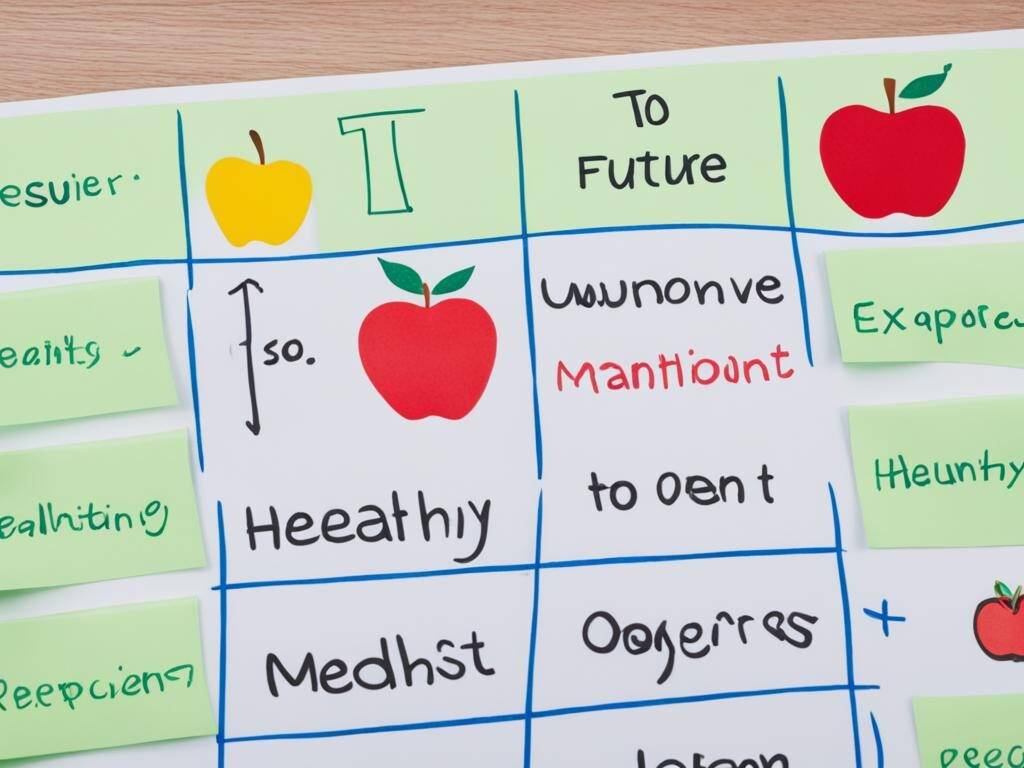Are you tired of trying every fad diet and quick-fix solution out there, only to regain the weight you lost? Do you want to discover a natural and permanent way to shed those extra pounds? Look no further. In this article, we will reveal effective strategies for losing weight naturally and permanently. Say goodbye to yo-yo dieting and hello to a healthier, happier you!
Losing weight naturally and permanently is not about restrictive diets or magical pills. It’s about adopting a holistic approach that focuses on sustainable lifestyle changes. Are you ready to dive in and uncover the secrets to achieving your weight loss goals in a healthy and lasting way? Read on to find out how to lose weight fast naturally and permanently.
Key Takeaways:
- Set realistic goals that are attainable and sustainable.
- Eat a balanced diet, incorporating nutrient-rich foods.
- Stay active by incorporating regular physical activity into your routine.
- Drink plenty of water to aid your weight loss efforts.
- Get sufficient sleep to support your weight loss journey.
Set Realistic Goals
When it comes to effective weight loss strategies and sustainable weight loss methods, setting realistic goals is key. It’s important to establish attainable targets that you can work towards, as this will help maintain your motivation and prevent feelings of disappointment.
By setting realistic goals, you give yourself a clear direction and focus for your weight loss journey. It allows you to break down your ultimate objective into smaller, achievable milestones, making the process more manageable and less overwhelming. This approach also helps you track your progress and celebrate your accomplishments along the way, fueling your determination and commitment.
To establish goals that are both achievable and sustainable, consider the following:
- Assess Your Current Habits: Take stock of your current lifestyle and eating habits. Identify areas where changes can be made and determine what aspects you want to work on.
- Be Specific: Set specific goals that are measurable and time-bound. For example, aim to lose a certain amount of weight within a realistic timeframe or commit to exercising a certain number of days per week.
- Start Small: Break your overall goal into smaller, more manageable steps. Begin by focusing on one or two changes at a time rather than attempting a complete overhaul all at once.
- Be Realistic: Consider your lifestyle, commitments, and personal circumstances when setting your goals. Make sure they align with what is realistically achievable for you and are sustainable in the long run.
- Monitor Your Progress: Regularly track your progress and make adjustments as needed. This will help you stay on track and ensure that you are moving towards your goals effectively.
Remember, effective weight loss is not just about reaching a specific number on the scale; it is about adopting a healthy lifestyle that you can maintain for the long term.
Set yourself up for success by setting realistic goals that are within your reach. This will provide you with a sense of accomplishment, keep you motivated, and ultimately lead you to achieve sustainable weight loss.
Expert Tip:
Consulting with a healthcare professional or a registered dietitian can provide you with personalized guidance and help you set realistic goals that are tailored to your individual needs and circumstances.

Eat a Balanced Diet
A balanced diet is essential for natural and permanent weight loss. By incorporating nutrient-rich foods into your meals, you can fuel your body with the necessary nutrients while promoting weight loss.
When it comes to a healthy diet, it’s important to focus on whole, unprocessed foods that provide a variety of vitamins, minerals, and fiber. Include a combination of fruits, vegetables, lean proteins, and whole grains in your daily meals. These foods are not only nutritious but also help keep you fuller for longer, reducing the likelihood of overeating.
Here are some tips for maintaining a balanced diet:
- Fill half of your plate with fruits and vegetables. These foods are low in calories but high in nutrients, making them a great choice for weight loss.
- Choose lean proteins such as chicken, fish, tofu, or beans to provide essential amino acids and help build and repair tissues. Aim to include protein in every meal to enhance satiety.
- Incorporate whole grains like quinoa, brown rice, and whole wheat bread, which are excellent sources of fiber and can help regulate blood sugar levels.
- Practice portion control by using smaller plates and bowls to avoid overeating. Listen to your body’s hunger and fullness cues to determine when to stop eating.
- Embrace mindful eating techniques such as eating slowly, savoring each bite, and paying attention to the flavors and textures of your food. This can help prevent mindless snacking and promote a healthier relationship with food.
Remember, a balanced diet is not about restriction or deprivation but rather about nourishing your body with wholesome, nutrient-dense foods. Your diet should be sustainable and enjoyable, allowing you to reach your weight loss goals while maintaining good overall health.

“A balanced diet is not about restriction or deprivation but rather about nourishing your body with wholesome, nutrient-dense foods.”
Stay Active
Regular physical activity is a crucial component of natural weight loss strategies and healthy weight loss techniques. By incorporating exercise into your daily routine, you can boost your metabolism, burn calories efficiently, and achieve your weight loss goals. Here are some tips to help you stay active:
- Cardiovascular Activities: Engage in activities that get your heart rate up and increase calorie burn. This can include brisk walking, jogging, cycling, swimming, or dancing. Aim for at least 150 minutes of moderate-intensity aerobic exercise per week.
- Strength Training Exercises: Incorporate strength training into your workout routine to build lean muscle mass. This helps increase your metabolism and burn more calories even at rest. Focus on exercises that target major muscle groups, such as push-ups, squats, lunges, and weightlifting.
- Find Activities You Enjoy: Choose physical activities that you genuinely enjoy doing. Whether it’s playing a sport, taking a dance class, or hiking in nature, finding activities that bring you joy will make it easier to stay consistent and motivated.
- Set Realistic Goals: Start with small, achievable goals and gradually increase the intensity and duration of your workouts. This will help prevent burnout or injuries while allowing you to progress steadily towards your fitness objectives.
- Stay Consistent: Make physical activity a habit by scheduling regular exercise sessions throughout the week. Treat them as non-negotiable appointments with yourself, just like any other important commitment in your life.
To illustrate the benefits of staying active, take a look at the following table:
| Activity | Calories Burned per Hour* |
|---|---|
| Running | 600-800 |
| Cycling | 400-600 |
| Swimming | 500-700 |
| Strength Training | 300-500 |
| Dancing | 300-500 |
*Calories burned may vary depending on factors such as body weight, intensity of the activity, and individual metabolism.

“Exercise is a celebration of what your body can do. Not a punishment for what you ate.”
Remember, staying active is not just about losing weight but also about improving your overall health and well-being. Find activities that you enjoy, set realistic goals, and make exercise a fun and integral part of your lifestyle. With consistency and dedication, you can achieve sustainable weight loss and maintain a healthy body.
Drink Plenty of Water
When it comes to natural weight loss remedies, one of the simplest and most effective methods is to drink plenty of water. Hydration plays a crucial role in sustainable weight loss, and it offers numerous benefits for your overall health and well-being.
Water helps to boost your metabolism, allowing your body to burn calories more efficiently. Additionally, it can help curb your appetite and reduce cravings, making it easier to stick to your healthy eating plan. By staying hydrated, you can support your weight loss efforts and maintain a balanced lifestyle.
So, how much water should you drink? While the recommended amount may vary depending on factors like your activity level and climate, a general guideline is to aim for eight 8-ounce glasses of water per day. This ensures that you stay properly hydrated throughout the day and reap the benefits of increased water intake.
Here are a few tips to help you increase your water consumption:
- Carry a reusable water bottle: Having a water bottle with you at all times serves as a reminder to drink water regularly.
- Add flavor to your water: If you find plain water boring, try infusing it with refreshing fruits like lemon, cucumber, or berries for a hint of natural flavor.
- Set reminders: Use a mobile app or set reminders on your phone to prompt you to drink water throughout the day.
By prioritizing hydration and making it a habit to drink plenty of water, you can enhance your weight loss journey and promote long-term success.

| Benefits of Drinking Water for Weight Loss | Ways to Increase Water Intake |
|---|---|
| 1. Boosts metabolism | 1. Carry a reusable water bottle |
| 2. Curbs appetite and reduces cravings | 2. Add flavor to your water |
| 3. Aids in digestion and detoxification | 3. Set reminders to drink water |
| 4. Supports overall health and well-being |
Get Sufficient Sleep
A good night’s sleep is crucial for achieving long-term weight loss success and natural ways to achieve rapid weight loss. Sleep deprivation can disrupt your body’s natural processes, including metabolism and appetite regulation, making it harder to lose weight and maintain a healthy weight.
“Sleep is renowned for its role in weight management. Insufficient sleep can lead to hormonal imbalance, increased hunger, and reduced willpower, all of which can hinder your weight loss efforts.” – Dr. Sarah Thompson, Sleep Specialist
How Sleep Affects Weight Loss
When you don’t get enough sleep, your body produces more ghrelin, the hormone responsible for stimulating hunger, while suppressing the production of leptin, the hormone that signals fullness. This hormonal imbalance can lead to increased cravings for unhealthy foods and overeating.
Lack of sleep also affects your body’s ability to process carbohydrates, leading to higher blood sugar levels and increased fat storage. Additionally, inadequate sleep can negatively impact your mood and energy levels, making it harder to stay motivated and engage in physical activity.
By prioritizing sufficient sleep, you can optimize your body’s natural processes and support your weight loss journey.
Tips for Improving Sleep Quality and Quantity
Follow these tips to ensure you get the sleep your body needs:
- Create a consistent sleep schedule: Go to bed and wake up at the same time every day, even on weekends.
- Create a relaxing bedtime routine: Engage in calming activities such as reading a book or taking a warm bath to signal to your body that it’s time to wind down.
- Create a sleep-friendly environment: Make your bedroom cool, dark, and quiet. Consider using blackout curtains, earplugs, or white noise machines.
- Avoid electronic devices before bed: The blue light emitted by screens can disrupt your sleep. Avoid using electronic devices at least an hour before bedtime.
- Avoid caffeine and stimulating activities: Limit caffeine intake and avoid stimulating activities close to bedtime. Opt for herbal tea or relaxation techniques instead.
Remember, getting sufficient sleep is just as important as diet and exercise when it comes to achieving long-term weight loss success. Make sleep a priority and reap the benefits of a healthier body and mind.

| Benefits of Sufficient Sleep for Weight Loss | Tips for Improving Sleep |
|---|---|
| 1. Regulates hunger hormones | 1. Create a consistent sleep schedule |
| 2. Reduces cravings and overeating | 2. Establish a relaxing bedtime routine |
| 3. Enhances metabolism and fat burning | 3. Create a sleep-friendly environment |
| 4. Boosts mood and energy levels | 4. Avoid electronic devices before bed |
| 5. Limit caffeine and stimulating activities |
Manage Stress Levels
Stress can have a significant impact on your weight loss journey. When you’re stressed, your body releases cortisol, a hormone that can increase your appetite and lead to emotional eating. Fortunately, there are proven techniques for managing stress that can support your long-term weight loss goals.
Relaxation Exercises
Engaging in relaxation exercises is an effective way to reduce stress levels and promote natural weight loss. These exercises can include deep breathing, progressive muscle relaxation, or guided imagery. Taking just a few minutes each day to practice these techniques can help you feel more calm and in control.
Meditation
Meditation is another powerful tool for managing stress and promoting mental well-being. By incorporating meditation into your daily routine, you can cultivate a sense of mindfulness and reduce anxiety. Find a quiet space, close your eyes, and focus on your breath or use a guided meditation app to help you get started.
Time Management
Poor time management can contribute to stress and make it difficult to prioritize self-care activities, such as exercise and healthy eating. By implementing effective time management strategies, such as creating a schedule, setting priorities, and delegating tasks when necessary, you can better manage your stress levels and create more balance in your life.
Reducing stress is a crucial component of natural weight loss strategies. By practicing relaxation exercises, incorporating meditation, and improving your time management skills, you can create a more supportive environment for long-term weight loss success.

Incorporate Intermittent Fasting
Intermittent fasting is a popular and effective method for healthy weight loss. It involves cycling between periods of eating and fasting, allowing your body to burn stored fat for energy. By incorporating intermittent fasting into your lifestyle, you can achieve rapid weight loss naturally.
There are different approaches to intermittent fasting, each with its own unique benefits and potential challenges. Here are some common methods:
- The 16/8 method: This involves fasting for 16 hours and restricting eating to an 8-hour window, such as from 12 PM to 8 PM. It can be easily incorporated into your daily routine.
- The 5:2 diet: With this method, you eat normally for five days of the week and restrict your calorie intake to 500-600 calories on the remaining two days.
- Alternate day fasting: This approach involves fasting every other day, where you restrict your calorie intake to 500-600 calories on fasting days.
Intermittent fasting offers several benefits for weight loss:
“Intermittent fasting can help reduce calorie intake, promote fat burning, and improve metabolic health.”
Research suggests that intermittent fasting can help regulate insulin levels, boost metabolism, and promote fat loss while preserving muscle mass.
The Potential Challenges of Intermittent Fasting
While intermittent fasting can be an effective weight loss strategy, it may pose certain challenges, especially during the initial adjustment phase. Some common challenges include:
- Feeling hungry during fasting periods
- Managing cravings
- Adapting to changes in meal timing
However, with time and practice, many individuals find that these challenges become easier to overcome.

| Benefits of Intermittent Fasting | Potential Challenges of Intermittent Fasting |
|---|---|
| 1. Promotes weight loss | 1. Feeling hungry during fasting periods |
| 2. Enhances insulin sensitivity | 2. Managing cravings |
| 3. Boosts metabolism | 3. Adapting to changes in meal timing |
| 4. Preserves muscle mass |
Seek Support and Accountability
Embarking on a weight loss journey can be challenging, but you don’t have to go through it alone. Seeking support and accountability can greatly enhance your chances of long-term success. Having a strong support system can provide encouragement, motivation, and guidance when you need it most.
One effective way to find support is by reaching out to friends, family members, or colleagues who have similar health and wellness goals. Sharing your aspirations and progress with like-minded individuals can create a sense of camaraderie and keep you motivated along the way.
If you prefer a more structured approach, consider joining a weight loss community or support group. These communities offer a space where you can connect with others who are on the same journey, exchanging tips, stories, and encouragement. Online forums and social media groups can also provide a virtual support network, allowing you to connect with people from all walks of life who share your goals.
Accountability plays a crucial role in maintaining consistency and staying on track. By having someone to answer to, whether it’s a friend, a family member, or a professional, you are more likely to stick to your weight loss plan and make healthier choices. An accountability partner can help keep you motivated and provide a fresh perspective when obstacles arise.
Additionally, technology can be a valuable tool in your weight loss journey. Mobile apps and online tools can help you track your progress, set reminders, and provide valuable insights. These digital resources can serve as a source of accountability, allowing you to monitor your food intake, exercise routines, and overall progress.
Benefits of Seeking Support and Accountability:
- Increased motivation: Surrounding yourself with supportive individuals can help boost your motivation and inspire you to achieve your weight loss goals.
- Accountability: Having someone to answer to can keep you accountable and prevent you from slipping back into old habits.
- Knowledge sharing: Connecting with others who have similar goals can provide you with new insights, strategies, and ideas for achieving long-term weight loss success.
- Emotional support: The weight loss journey can be emotionally and mentally challenging. Having a support system can provide comfort, understanding, and encouragement during difficult times.
- Celebrating milestones: Sharing your successes and milestones with others can make the journey more enjoyable and rewarding.
Remember, it’s important to find the support and accountability methods that work best for you. Whether it’s joining a community, seeking guidance from a professional, or utilizing digital tools and apps, integrating support and accountability into your weight loss journey can significantly increase your chances of achieving permanent weight loss and long-term success.

Avoid Crash Diets and Quick Fixes
When it comes to weight loss, it can be tempting to resort to crash diets and quick-fix solutions. However, these approaches often lead to temporary results and can have negative impacts on your health. Instead, focus on sustainable and natural weight loss methods that promote long-term success. By making healthy lifestyle changes, you can achieve your weight loss goals and maintain a healthy weight for life.
Crash diets, which involve severe calorie restriction, may result in rapid weight loss initially. However, this weight loss is often due to water weight and muscle loss rather than fat loss. Additionally, these diets are difficult to sustain over the long term and may lead to nutrient deficiencies.
Quick-fix solutions, such as diet pills or meal replacement shakes, may promise rapid results, but they are not a sustainable approach. These methods often rely on restricting food intake or replacing meals with low-calorie substitutes. While they may lead to short-term weight loss, they are not a sustainable or healthy way to achieve and maintain your desired weight.
Instead of relying on crash diets or quick fixes, focus on gradual and sustainable weight loss strategies. This involves making lifestyle changes that promote overall health and well-being. By adopting a balanced diet, staying active, managing stress, and prioritizing self-care, you can reach your weight loss goals naturally and maintain your progress in the long term.
“Sustainable and natural weight loss is the key to long-term success.”
Remember, weight loss is not just about a number on the scale. It’s about creating a healthy and balanced lifestyle that supports your overall well-being. By prioritizing natural weight loss tips and best practices, you can achieve lasting results that enhance both your physical and mental health.

| The Pitfalls of Crash Diets and Quick Fixes | The Benefits of Sustainable and Natural Weight Loss |
|---|---|
|
|
Stay Consistent and Patient
Consistency and patience are the keys to achieving quick and permanent weight loss solutions and long-term weight loss success. While it’s natural to want instant results, it’s important to remember that sustainable weight loss takes time and effort. Here’s how you can stay motivated and maintain a positive mindset throughout your weight loss journey:
- Set Realistic Expectations: Understand that losing weight at a steady pace is healthier and more sustainable than trying crash diets or quick fixes. Establish achievable goals that focus on long-term success.
- Celebrate Small Victories: Acknowledge and appreciate the progress you make along the way, no matter how small. Each healthy choice and positive step counts and contributes towards your ultimate goal.
- Stay Focused on Your Why: Remind yourself of the reasons why you started your weight loss journey. Whether it’s improving your health, increasing your confidence, or setting a good example for your loved ones, staying connected to your motivation will help you stay consistent.
- Track Your Progress: Keep a record of your achievements, whether it’s your weight, measurements, or fitness milestones. Seeing the progress on paper can be incredibly motivating and reinforce your commitment.
- Stay Mindful of Your Eating Habits: Be aware of your food choices and eating behaviors. Practice mindful eating, paying attention to your hunger and fullness cues. This can help you develop a healthier relationship with food and avoid emotional eating.
- Seek Support and Accountability: Surround yourself with a supportive network of friends, family, or a weight loss community. Share your experiences, challenges, and achievements with them. Additionally, consider finding an accountability partner who can help keep you on track.
- Overcome Setbacks: Weight loss journeys are not always linear. Expect setbacks, but instead of letting them discourage you, view them as learning opportunities. Identify the factors that led to the setback and develop strategies to overcome them.
Remember, lasting weight loss is a marathon, not a sprint. Be patient with yourself and your body. Embrace the process and focus on maintaining a healthy lifestyle. Your efforts will pay off, and you will achieve the long-term weight loss success you desire. Stay consistent, stay patient, and celebrate each step forward.
For inspiration, take a look at this image that symbolizes the dedication and perseverance needed for sustainable weight loss:

Make Healthy Eating a Habit
When it comes to achieving natural and sustainable weight loss, developing healthy eating habits is key. By incorporating nutritious foods into your daily routine and overcoming common challenges, you can make healthy eating an enjoyable and effortless habit. Here are some effective ways to lose weight naturally and adopt sustainable weight loss methods.
1. Prioritize Nutritious Foods
Start by including nutrient-rich foods in your meals, such as fruits, vegetables, lean proteins, and whole grains. These foods provide essential vitamins, minerals, and fiber while keeping you full for longer. Try to incorporate a variety of colorful fruits and vegetables to ensure a well-rounded diet.
2. Plan Your Meals
“Failing to plan is planning to fail.”
Meal planning can help you stay on track with your healthy eating goals. Take some time each week to plan your meals and snacks in advance. This will not only save you time and money but also ensure that you have nutritious options readily available.
3. Practice Portion Control
Achieving sustainable weight loss is not just about what you eat but also how much you eat. Practice portion control by listening to your body’s hunger and fullness cues. Use smaller plates and bowls to help manage portion sizes and avoid overeating.
4. Incorporate Mindful Eating
Mindful eating involves paying attention to your eating experience without distractions. Slow down and savor each bite, appreciating the flavors and textures of your food. This practice can help prevent overeating and promote a healthier relationship with food.
5. Overcome Common Challenges
“Success is not final, failure is not fatal: it is the courage to continue that counts.” – Winston Churchill
Understand that adopting healthy eating habits takes time and effort. Be prepared to overcome common challenges such as cravings, emotional eating, and social situations. Seek support from friends, family, or a weight loss community to stay motivated and accountable.
Remember, sustainable weight loss is a journey, not a quick fix. By making healthy eating a habit, you can achieve your weight loss goals naturally and maintain them in the long run.

| Benefits of Making Healthy Eating a Habit | Challenges to Overcome |
|---|---|
|
|
Stay Mindful of Your Eating Habits
Mindful eating is a powerful tool in your natural weight loss journey. It involves tuning in to your body’s hunger and fullness cues, allowing you to make conscious choices about what and how much you eat. By practicing mindful eating, you can develop a healthier relationship with food and avoid mindless overeating or emotional eating.
Being mindful while eating means being fully present in the moment, paying attention to the taste, texture, and satisfaction level of each bite. By savoring your food and listening to your body, you can better understand its nutritional needs and prevent unnecessary weight gain.
Mindful Eating Techniques
Here are some effective techniques to practice mindful eating:
- Slow Down: Take your time while eating and chew each bite thoroughly. This allows your body to register feelings of fullness.
- Eliminate Distractions: Turn off the television, put away your phone, and focus solely on the act of eating. This helps you savor each mouthful and avoid overeating.
- Listen to Your Body: Pay attention to physical hunger and fullness signals. Eat when you’re hungry and stop when you’re comfortably satisfied.
- Engage Your Senses: Notice the colors, smells, and tastes of your food. Take pleasure in the experience of eating and appreciate the nourishment it provides.
- Practice Portion Control: Use smaller plates and bowls to visually trick your mind into feeling satisfied with smaller portions.
Remember, moderation is key. Allowing yourself to enjoy occasional indulgences without guilt is part of a balanced approach to mindful eating.

The Benefits of Mindful Eating
By incorporating mindful eating into your daily routine, you can reap numerous benefits:
- Weight Management: Mindful eating helps you recognize true hunger and differentiate it from emotional cravings, reducing the likelihood of overeating and promoting a healthy weight.
- Improved Digestion: Taking the time to thoroughly chew your food aids digestion and allows your body to absorb nutrients more effectively.
- Enhanced Satisfaction: By savoring each bite and being present during meals, you can increase your overall satisfaction and reduce the desire to snack unnecessarily.
- Better Food Choices: Mindful eating encourages you to make conscious choices about the foods you consume, leading to a preference for nutrient-dense options.
- Reduced Emotional Eating: By paying attention to your emotions and finding alternative coping mechanisms, such as engaging in relaxing activities, you can break free from the cycle of emotional eating.
By staying mindful of your eating habits, you can harness the power of awareness to support your natural weight loss journey.
Track Your Progress
Tracking your progress is crucial for long-term weight loss success. By monitoring your journey, you can stay accountable and motivated, making adjustments as necessary. There are various proven techniques you can use to track your progress and maintain your momentum.
1. Food Journals
Keeping a food journal is an effective way to monitor your eating habits and identify areas for improvement. Simply record what you eat and drink throughout the day, including portion sizes. This technique allows you to reflect on your choices and make mindful adjustments.
2. Fitness Apps
In today’s digital age, fitness apps offer a convenient and accessible method for tracking your weight loss progress. These apps provide features such as calorie counters, activity trackers, and personalized workout plans. Choose an app that aligns with your goals and lifestyle.
3. Body Measurements
Tracking your body measurements is an excellent way to monitor changes that may not be reflected on the scale. In addition to tracking weight, measure your waist, hips, arms, and thighs regularly. This method helps you perceive progress in terms of inches lost and overall body composition.
Combining these tracking techniques allows you to have a comprehensive understanding of your weight loss journey. Consider using them in combination to maximize your results and discover what works best for you.
“Tracking your progress enables you to see how far you’ve come and inspires you to keep going. It’s the roadmap to your success!”
| Tracking Method | Benefits |
|---|---|
| Food Journals |
|
| Fitness Apps |
|
| Body Measurements |
|

Tracking your progress not only allows you to celebrate your achievements but also enables you to make informed decisions and adjustments along your weight loss journey. Embrace these techniques and stay motivated as you work towards a healthier and happier you.
Adapt Your Lifestyle
Successful weight loss involves making long-term lifestyle changes. It’s not just about following a temporary diet or exercise plan, but about adopting healthy habits that you can sustain over time. By adapting your daily routines and making small but impactful changes, you can achieve permanent weight loss and maintain a healthy body.
Meal Planning
One of the key aspects of adapting your lifestyle for weight loss is meal planning. By planning your meals in advance, you can ensure that you’re making nutritious choices and avoiding impulsive, unhealthy options. Consider creating a weekly meal plan that includes a variety of fruits, vegetables, lean proteins, and whole grains. This way, you have a roadmap for healthy eating and are less likely to give in to unhealthy temptations.
Grocery Shopping
Another important aspect of a healthy lifestyle is mindful grocery shopping. When you head to the supermarket, make a list of the items you need based on your meal plan. Stick to that list and avoid indulging in impulse purchases. Focus on purchasing fresh, whole foods and minimize the number of processed snacks and sugary treats you bring home. Having a well-stocked pantry and refrigerator with nutritious ingredients sets you up for success in your weight loss journey.
Physical Activity
Incorporating physical activity into your daily routine is essential for long-term weight loss. Find an exercise routine that you enjoy and can realistically commit to. It could be as simple as taking a brisk walk every day, joining a fitness class, or participating in a sport you love. Remember, the key is consistency. Aim for at least 150 minutes of moderate-intensity aerobic activity or 75 minutes of vigorous-intensity aerobic activity per week, along with strength training exercises for all major muscle groups at least twice a week. Gradually increase the intensity and duration of your workouts as your fitness level improves.
“Adapting your lifestyle for weight loss is about making sustainable changes that you can maintain for the long haul.”
By incorporating meal planning, mindful grocery shopping, and regular physical activity into your daily routine, you can create a sustainable lifestyle that supports healthy weight loss. Remember, the key is to make gradual changes that become second nature and are enjoyable. This will help you achieve permanent weight loss and improve your overall well-being.

Now that we have discussed how to adapt your lifestyle for weight loss, let’s move on to the final section of our article where we’ll summarize the key points and offer some concluding thoughts.
Conclusion
In conclusion, achieving natural and permanent weight loss requires a holistic approach that focuses on setting realistic goals, maintaining a balanced diet, engaging in regular physical activity, and prioritizing self-care. By following these proven strategies, you can successfully reach and maintain a healthy weight for life.
Setting realistic goals is key to staying motivated and avoiding disappointment. By establishing attainable targets, you can track your progress and celebrate small victories along the way.
Incorporating a balanced diet rich in nutrient-dense foods, such as fruits, vegetables, lean proteins, and whole grains, not only supports weight loss but also promotes overall health and well-being.
Regular physical activity is essential for burning calories, boosting metabolism, and improving overall fitness. Finding activities that you enjoy and making them part of your daily routine will help you stay consistent and maintain your weight loss efforts.
Lastly, prioritize self-care by getting sufficient sleep, managing stress levels, and staying mindful of your eating habits. Taking care of your mental and emotional well-being is just as important as taking care of your physical health when it comes to achieving long-term weight loss success.

